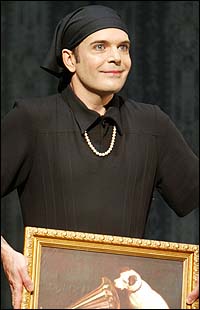
*
Last week’s Pulitzer win for Annie Baker’s play The Flick got theatre people talking more than the annual announcement of the prize usually does.
Some of the discussions centered of it being a conspicuous victory for the controversial play, which was critically praised but divided audiences due to its length (three hours), plot (seemingly none, to the eyes of detractors) and staging (so realistic as to be barely separable from the humdrum of daily life). But other observers noted that the win put Playwrights Horizons, the nonprofit that staged the work, in rarified territory.
The Flick marks the sixth production to have its premiere at the theatre prior to taking the Pulitzer Prize in Drama. Other Playwrights Horizons works to win the Pulitzer include: Clybourne Park (2011); I Am My Own Wife (2004); The Heidi Chronicles (1989); Driving Miss Daisy (1988); and Sunday in the Park With George (1985). (The theatre was founded in 1971.)
The only other producing entity to have won the Pulitzer as many times is Manhattan Theatre Club, which produced, or co-produced, Ruined (2009), Rabbit Hole (2007), Doubt (2005), Proof (2001), The Piano Lesson (1990) and Crimes of the Heart (1980).
This achievement has been pointed out to Tim Sanford, Playwrights Horizons’ long-serving artistic director.
“There are people who count,” he told Playbill.com, “including my managing director.”
Sanford has been artistic director during three of those triumphs (Andre Bishop was artistic director when the first three were collected), but he’s been with the company long enough to have remembered all six.
| |
 |
|
| Crystal A. Dickinson and Annie Parisse in Clybourne Park | ||
| Photo by Joan Marcus |
Asked if the announcement came as a surprise, he said, “Well, of course it did. It’s only a recent turn of event in the last three of four years where a play like The Flick, which opened Off-Broadway and closed and is currently not running, would even be considered.
“I was not completely astonished,” he continued. “If The Flick had won five years ago, I would have been astonished.”
The Flick is about three low-paid, directionless cinema employees working in Massachusetts' last 35-millimeter projector house. The production featured seemingly mundane conversations and daily interactions as well as long stretches of silence. Devotees found the piece thrillingly realistic, daring in execution and poignant in its quiet appraisal of bottom-rung souls' search for scraps of meaning in a chaotic, speeded-up world.
The Pulitzer committee called the play a "thoughtful drama with well-crafted characters that focuses on three employees of a Massachusetts art-house movie theatre, rendering lives rarely seen on the stage." “Someone asked me, ‘Well, now do you feel vindicated in the choice of it?’” said Sanford, who, during The Flick’s run, was compelled to defend his decision to stage the work, “and I quipped back, 'I felt vindicated when it won the Susan Smith Blackburn Prize.' Because that’s another barometer of success.”
Whether the prize will convince Playwrights Horizons subscribers irked by The Flick to stay, or attract new theatregoers, remains to be seen. But Sanford is philosophical about the matter
| |
 |
|
| Jefferson Mays in I Am My Own Wife | ||
| Photo by Joan Marcus |
Sanford also indicated that such honors, while pleasant to receive, must be taken with a grain of salt.
“All of us in the business know there’s a certain randomness to all these awards that are given out,” he argued. “They’re very dependent on the tastes of whoever is on the committee. You don’t want to make too much of it in your head, because it doesn’t mean it’s the best play in the estimation of everyone in the world.”
One concrete positive aspect of the award is that The Flick will now likely receive an encore production Off-Broadway. “It’s quite a boost to have it singled out, because it’s a great play and will increase the possibility that it will come back,” said Sanford.
The Pulitzers also brought good fortune to another Playwrights Horizons production: Madeleine George’s The (curious case of the) Watson Intelligence, which opened to only middling reviews.
“By far the most surprising aspect of the prize was The (curious case of the) Watson Intelligence being a runner-up,” remarked Sanford. “That can have a great effect. It was uncertain that it was going to be published by a top trade, and now it will be.”









